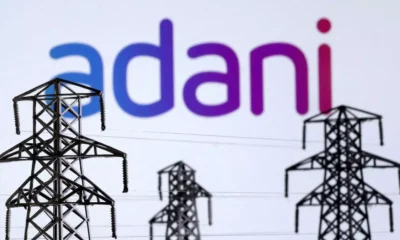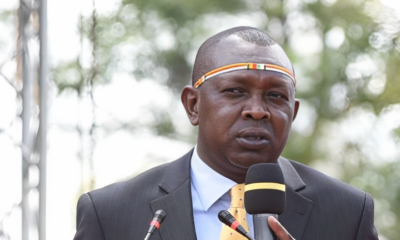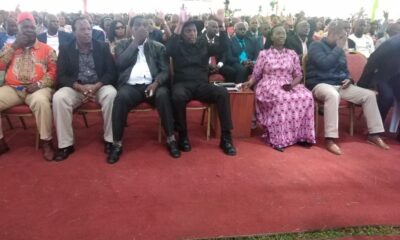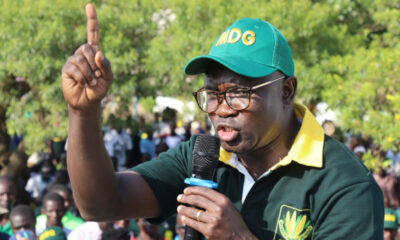Technology
Morris Mbetsa: Creator Of Africa’s First Flying Drone Taxi
IT-Innovator Morris Mbetsa in a reflective mode at his Nairobi office.
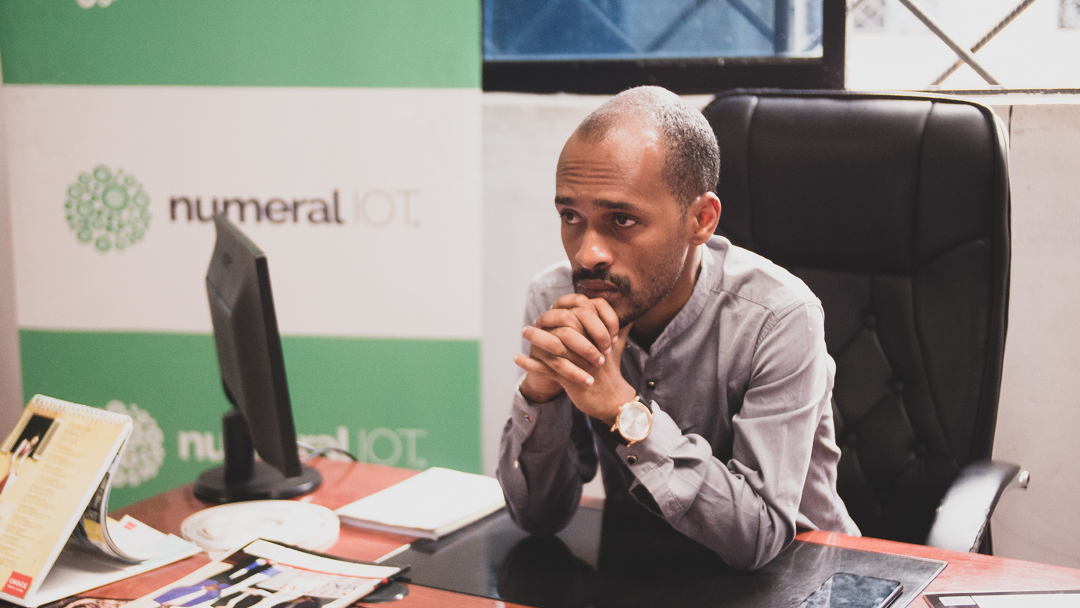
Morris Mbetsa,33, is arguably Kenya’s contrarian manufacturer, widely known for creating Africa’s first drone flying taxi and including abandoning his university studies at a local institution and relocating to the US. He has also operated from Nigeria, Africa’s largest economy and travelled to China to scour for opportunities to sell his hardware. This guy is daring. Now for the very first time, he reveals, that his Nairobi-based company Numeral IOT is in the last stages of a discussion that will lead to a merger with a global brand.Here he goes ahead to field questions fixated on his entrepreneurial journey thus far.
By Charles Wachira
1)In 2018 you manufactured Africa’s first drone flying taxi which aimed to manoeuvre the apparent challenge of traffic jams witnessed on generic African roads including enhancing the delivery of critical products and services like medicare. How was the innovation treated by the Kenyan authorities and generally the world? And how is the contraption faring in the marketplace today and what challenges if any have you faced in selling the product in the market?
Morris Mbetsa – In general, the development of drone technology was met with both excitement and concern from regulatory authorities and the public. On the one hand, our drone offered a range of exciting possibilities for enhancing efficiency and improving access to critical services like healthcare and logistics in areas where traditional infrastructure was lacking. On the other hand, there were concerns about safety, privacy, and potential misuse of this technology.
The project was a labor of love inspired by a desire to better the lives of us black people.
As I started the project, I quickly realized that it would require far more funds than I had anticipated. I didn’t have the funds to invest in it myself at the time. As a result, I was constrained to fund the project through grants and well-wishers.
We pitched the project to a couple of investors, including some high-profile ones, but it was deemed too risky and ahead of its time. While the investors were impressed with the project’s potential, they did not believe it was a sound investment.
Despite our efforts to secure funding, we couldn’t continue with the project without additional investors, prompting me to transition my focus to more practical devices that could be monetised.
I learned a lot from the project and it made me better prepared to approach future endeavors with a more comprehensive understanding of the industry and its challenges.
2)Your company which you launched in 2019 was known as Numeral IOT -please explain how you came up with the name.
Morris Mbetsa -We chose the name because it reflects the technological aspect of our company. The choice of the word “numeral” suggests a focus on numbers, which are fundamental to binary computer languages, and reflects the digital nature of our company.
The addition of “IoT” to the name also shows our involvement in the Internet of Things, a rapidly growing field that involves connecting physical devices to the Internet to enable them to communicate with each other and with other systems.
Overall, the name Numeral IoT conveys a sense of innovation and technological advancement.
3) What stirred you towards the road leading to the ecosystem that you operate in?
Morris Mbetsa- Since I was a child, I always had an interest in this field. I’m fascinated by electronics’ inner workings and enjoy tinkering with them. Over time, I realized that most of the hardware we use in Africa is imported from other countries and is not always designed with the African market in mind.
This sparked a childhood ambition of mine to establish a factory where I could manufacture critical electronics and make them available to the African masses. By doing so, I believe we will be able to bridge the digital divide and provide more people with access to modern technology that will help them improve their lives.
Furthermore, I believe that IoT is the technological future and a critical component of the digital transformation that is taking place across industries. By incorporating IoT into normal hardware , we can create innovative products that are more intelligent, connected, and better suited to meet the needs of the African market
4)Before setting up the company you travelled to China for some specialized training. How did you manage to pay off the fees required? Also please tell our readers how and why you made contact with that particular Asian country and what you learnt from there that has proved to be useful with your entrepreneurial career so far.
Morris Mbetsa -I travelled to China because my business partner at that time and I were working on a project together, my trip was paid for by his company. The trip’s goal was to look into manufacturing opportunities for our hardware in China, which was the world’s undisputed factory at the time.
While I was there, I was able to observe firsthand how the factories operated and how the manufacturing process worked. One thing that struck me was that most of the factory workers were low-skilled labourers whose jobs didn’t require traditional school knowledge. This gave me the inspiration to work with my African people and provide employment opportunities for them.
In addition to gaining inspiration for my manufacturing processes, I was able to make valuable connections with chip and component suppliers, who are crucial for our manufacturing. These connections have been beneficial in securing the necessary supplies and components for our manufacturing operations.
5)You once set base in Nigeria please explain what led to the relocation and why you settled for that particular West African state.
Morris Mbetsa -I moved to Nigeria because my business partner at that time had ties in Nigeria and we saw an opportunity in the market. At that time, Nigeria had implemented speed governor regulations in the country, which created a demand for speed governors.
We saw an opportunity to produce speed governors for the Nigerian market, and my business partner’s ties in the country made it a logical choice for us to set up our operations there. This allowed us to tap into the local market and also take advantage of the regulations that had been put in place.
6) You were admitted to The Technical University of Kenya to pursue a degree in electrical engineering in …. but you quit after a few months reportedly because you got bored of the theoretical nature of the course and eventually moving the United States for a short course courtesy of Barack Obama’s Young African Leaders Initiative (YALI). You also attended Notre Dame University based there where you underwent studies in aeronautical training. Please explain how different the teaching is comparing the US and Kenya and how it has contributed to your entrepreneurial journey.
Morris Mbetsa -In my opinion, my education in the United States was particularly eye-opening, especially in comparison to my education in Kenya. I discovered that the education system in the United States was more practical and project-based, allowing me to interact with real-world professionals from companies such as Microsoft and IBM. This gave me hands-on experience and allowed me to develop valuable skills that I could apply in the real world.
Furthermore, I discovered that the education system in the United States was full of sharp, like-minded individuals who were as smart and forward-thinking as I was. I was able to connect with people who shared similar interests and goals.
Through my education in the United States, I was able to make genuine connections with people who have remained influential in both my professional and personal lives to this day.
7)To date, what has your company innovated and of those gadgets which one is your signature innovation and why?
Morris Mbetsa -Our company has produced several products including speed governors, trackers, smart home devices such as smart bulbs and locks, security, and game-changing smart meters for gas, water, and electricity.
The smart meters are revolutionary and unique in their features and capabilities. They offer solutions that are not available on the market and have opened doors for our company. Due to our local manufacturing and the unique features of our smart meters, we have received significant interest and partnership opportunities from across West Africa, East Africa, and North Africa
8) Do you have a research and development unit within your organisation and if in the affirmative, on average how long does it take to create a product? Or is your organisation manufacturing DNA a creature of knee-jerk reactions?
Morris Mbetsa -Our RND (Research and Development) process is tailored to the scope, budget, and level of complexity of each project. Our team approaches research and development in a flexible and adaptable manner.
We base our decisions on large-order demands. We prioritize, however, understanding the needs and pain points of industry clients and organizations.
Before producing a working prototype, the RND process typically takes at least three months. We take a methodical and thorough approach to R&D, which is critical for ensuring the final solution’s quality and feasibility.
9) What new product are you working on currently?
Morris Mbetsa -our team is currently working on large-scale projects ranging from the LPG (liquefied petroleum gas) to solar industries. This project is related to developing solutions that combine these two energy sources, to create more efficient and sustainable energy solutions for disadvantaged communities
10)How many employees do you have under your payroll and how much do you estimate your company is worth in dollar terms?
Morris Mbetsa – We are amid partnerships and confidential agreements, so kindly excuse me from answering these questions for the time being.
11) Are your products only to be found in Kenya and how do you market your creations?
Morris Mbetsa -Our company offers services to clients from Tanzania, Liberia, Ethiopia, in addition to Kenya. We have a global perspective and are not geographically restricted.
Our company has worked with large organizations in the past and is well-equipped to handle complex projects and challenges.
12)Please tell us about the talk in the grapevine regarding talks coalescing around mergers and partnerships involving Numeral IOT
Morris Mbetsa -I can’t say much about this because the process is ongoing but all I can say is be on the lookout for the name Spearhead. inc
13)In the next five years where do you see you envisage your company?
Morris Mbetsa -To become one of, if not the largest electronics manufacturer in Africa, with a strong focus on IoT technology. We envision having one of the biggest IoT platforms on the continent, which will enable Africans to get analytics on their connected devices at very low costs. This is a significant goal that could have a major impact on the development and adoption of IoT technology in Africa.
We plan to accelerate the transition to IoT in Africa by having factories across the continent.
We are keen on investing in infrastructure and resources that will support the growth and development of IoT technology in Africa.

Technology
Kenya & Mauritius Lead East Africa’s Cybercrime Battle

: Kenya and Mauritius face rising DDoS attacks, topping East Africa. Discover
what drives these threats and how nations are fortifying defences.
Kenya and Mauritius are increasingly becoming hotspots for cybercrime in East Africa,
according to the recently released NETSCOUT 1H2024 DDoS Threat Intelligence
Report (TIR).
Both countries recorded the highest volumes of Distributed Denial-of-Service (DDoS)
attacks in the region, with cybercriminals deploying increasingly sophisticated, multi-
vector techniques to disrupt services.
DDoS SURGE IN KENYA AND MAURITIUS
Bryan Hamman, Regional Director for Africa at NETSCOUT, emphasised the growing
threat.
“Kenya and Mauritius are bearing the brunt of DDoS attacks in East Africa. Attackers
are not only increasing the volume but also leveraging multi-vector approaches that
make detection and mitigation far more challenging,” Hamman explained.
In Kenya, where the tech ecosystem thrives on innovations such as M-Pesa and
expansive mobile banking services, the Communications Authority of Kenya (CA)
reported a 12% increase in cyberattacks in the first half of 2024, translating to 459
million incidents.
Similarly, Mauritius, recognised as a financial hub, saw a sharp rise in attacks on its
financial services sector, a key contributor to its GDP.
WHAT DRIVES THE TARGETTING OF KENYA AND MAURITIUS?
Technological Advancement:
Both nations are at the forefront of digital transformation in East Africa, which,
while driving economic growth, also exposes vulnerabilities. Hamman noted,
“The more interconnected these economies become, the larger the attack
surface for cybercriminals.”
Economic Significance:
Kenya’s dominance as a regional tech hub and Mauritius’s role in global financial
services make them prime targets for malicious actors seeking to exploit high-
value systems.
Insufficient Cybersecurity Infrastructure:
Despite advancements, gaps in cybersecurity frameworks persist. For instance,
Kenya’s Data Protection Act of 2019 and Mauritius’s cybersecurity strategy have
struggled to keep pace with the sophistication of modern cyber threats.
COMPARISON WITHIN EAST AFRICA
While Kenya and Mauritius grapple with these challenges, regional peers like Rwanda
and Tanzania have demonstrated resilience.
- ● Rwanda: Known for its proactive measures, such as the National Cyber Security
- Authority (NCSA), Rwanda has kept DDoS incidents relatively low. In the first half
- of 2024, the country reported only 36 million attacks.
- ● Tanzania: With the establishment of its Computer Emergency Response Team
- (CERT) in 2020, Tanzania has reduced phishing and ransomware incidents by
- 35% and 20%, respectively.
IMPACT OF CYBERCRIME

The repercussions are severe, affecting sectors critical to economic stability:
● Kenya: The banking and telecommunications sectors, central to the country’s
GDP, have faced significant disruptions. Safaricom reported a two-hour outage in
April 2024 linked to a DDoS attack, costing millions in lost revenue.
● Mauritius: The financial services industry has suffered data breaches and
operational downtimes, undermining investor confidence.
RECOMMENDATIONS FOR ACTION
Enhanced Cybersecurity Policies:
Governments must update regulations to reflect evolving threats. Public-private
partnerships can also drive innovation in defence mechanisms.
Regional Collaboration:
Establishing an East African Cyber Defense Alliance could enable nations to
share threat intelligence and resources.
Investment in Education and Awareness:
Cyber hygiene training for individuals and businesses can help minimize
vulnerabilities, particularly against phishing attacks and social engineering
tactics.
Adoption of Advanced Technologies:
Leveraging tools like AI-driven threat detection can provide real-time responses
to attacks.
CONCLUSION
As cybercriminals grow bolder and more sophisticated, Kenya and Mauritius must
accelerate efforts to fortify their defences. “A regional approach that blends technology,
policy, and awareness is key to turning the tide against these threats,” Hamman
concluded.
The path forward is clear: a united East African front, coupled with robust internal
reforms, can transform the region from a target to a cybersecurity stronghold.
Technology
MTN Uganda Reports 29.6% Profit Rise to Shs 459.4bn in 2024
MTN Uganda’s revenue from mobile data and MoMo services jumped over 20% year-on-year, driven by growing demand for digital financial solutions and a strong focus on expanding MoMo’s reach.

: MTN Uganda’s profit climbs by 29.6% to Shs 459.4bn for 2024’s first nine months, driven by digital growth, fintech, and network expansion strategies.
MTN Uganda reported a 29.6% increase in profit after tax, reaching Shs 459.4 billion for the first nine months of the year, compared to Shs 354.5 billion during the same period in 2023.
This growth reflects the telecom giant’s strategic focus on expanding digital services and enhancing network coverage to capture more market share in Uganda’s competitive telecommunications sector.
CEO Cites Strategic Expansion and Digital Focus
Chief Executive Officer Sylvia Mulinge attributed the profit jump to effective cost management and a strong emphasis on digital transformation.
“Our increased investment in infrastructure and focus on digital financial services continue to yield positive results, as seen in this remarkable growth,” she stated during the earnings release.
Fintech and Data Services Lead Revenue Growth
Mobile data and MTN Mobile Money (MoMo) services played a significant role, as revenue from these segments has grown by over 20% year-on-year.
With Uganda’s demand for digital financial solutions rapidly increasing, MTN Uganda’s focus on expanding MoMo has led to a substantial boost in customer uptake, contributing to a large portion of this year’s growth.
Investments in Network Infrastructure Pay Off
MTN Uganda’s ongoing investments in 4G and 5G network infrastructure have also proven profitable.
In 2024, the company increased its capital expenditure to Shs 200 billion, up from Shs 160 billion in 2023, to meet the growing demand for faster and more reliable internet. “MTN Uganda has successfully captured the increased demand for reliable and faster internet,” said Henry Tumusiime, a telecom analyst based in Kampala. “Their proactive approach to enhancing data service capabilities has kept them ahead, especially as the economy becomes more digitised.”
Youth-Focused Campaigns Expand Subscriber Base
MTN’s early 2024 campaign aimed at youth — offering affordable data bundles and free educational content — attracted over 500,000 new users, expanding its subscriber base to 17 million, up from 16.5 million in 2023. This campaign has been instrumental in further driving revenue growth.
Outlook: Commitment to Quality and Digital Inclusion
Looking forward, MTN Uganda remains focused on delivering high-quality, affordable services to enhance digital inclusion. “As we approach year-end, our strategy remains anchored on delivering quality service, ensuring affordability, and growing digital inclusion,” Mulinge added.
MTN Uganda’s performance aligns with MTN Group’s broader strategy to connect Africa and strengthen digital finance solutions across the continent.
Technology
Skyleader 600 Launch in Tanzania: Boosting Local Aircraft Manufacturing
The Skyleader 600 marks a pivotal moment for Tanzania, not only in aviation but in its broader industrial aspirations.
With its maiden landing at Julius Nyerere International Airport, the aircraft stands as a symbol of Tanzania’s growing capacity to innovate, manufacture, and compete on the global stage.
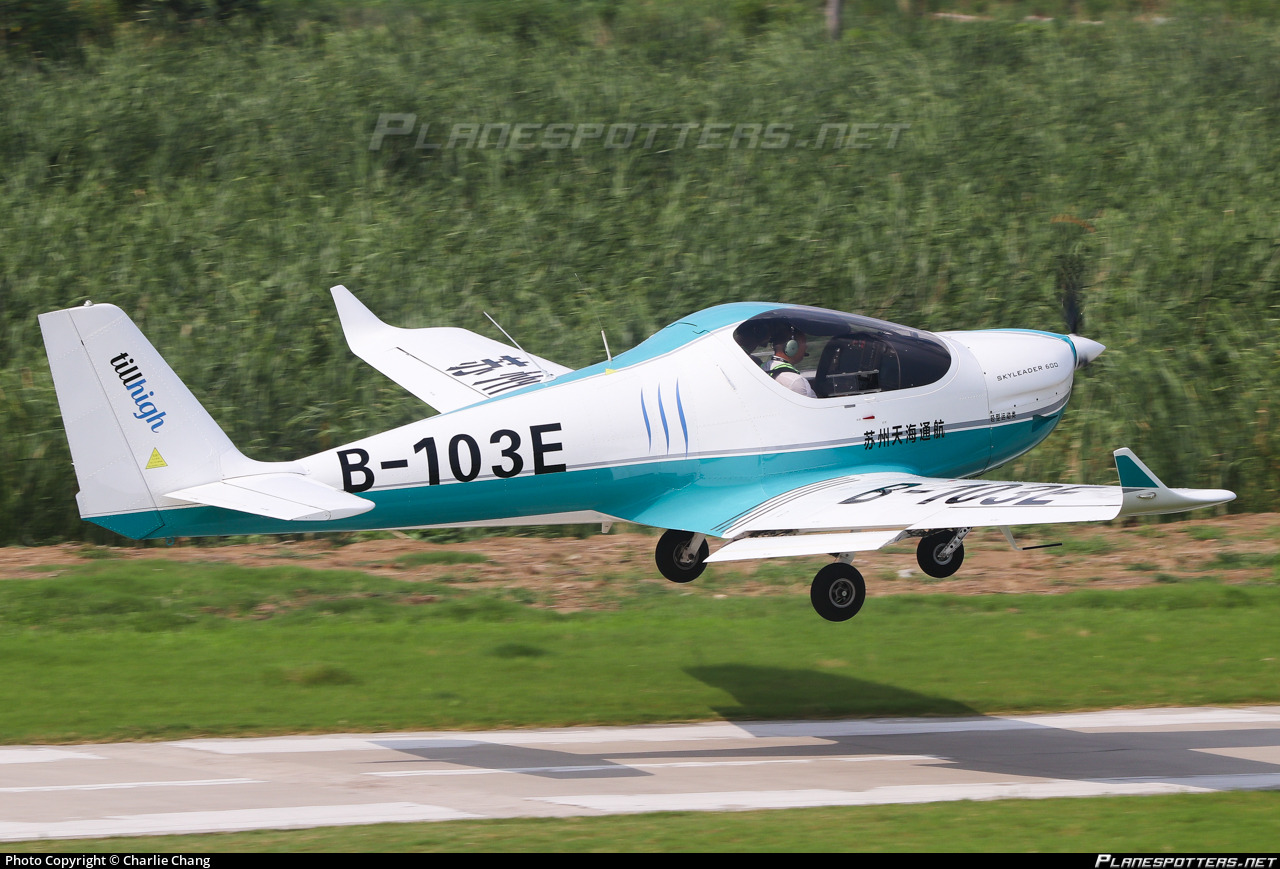
Discover Tanzania’s aviation breakthrough with the Skyleader 600, the first locally manufactured ultralight aircraft, unveiled at TIMEXPO 2024 in Dar es Salaam
By Charles Wachira
In a groundbreaking achievement for Tanzania and Africa’s aviation sector, AIRPLANE Africa Limited (AAL), based in Morogoro, launched the Skyleader 600, marking the first ultralight aircraft manufactured in the country.
The official unveiling took place at TIMEXPO 2024 in October 2024, setting a new milestone for local manufacturing and economic potential.
The Skyleader 600: A Game-Changer in African Aviation Designed with business travelers in mind, the Skyleader 600 can carry two passengers, offering a cost-effective alternative for long-distance travel.
The aircraft is praised for its modern design, affordability, and low maintenance costs.
Powered by petrol fuel, it addresses the growing demand for accessible and efficient transportation across Tanzania and the wider African market.
AAL’s Director, David Grolig, proudly remarked at the launch, “This is a historic moment not just for AIRPLANE Africa Limited, but for Tanzania. We have built something that will change the way people travel in this country and beyond.”
His statement reflects the company’s larger vision to transform Tanzania into a key player in ultralight aircraft manufacturing in Africa.
From Morogoro to the Skies: AAL’s Journey The journey to the Skyleader 600 began in 2019, when AIRPLANE Africa Limited was established in Morogoro.
The company blended local Tanzanian expertise with Czech aviation technology, a country renowned for its ultralight aircraft production.
This strategic collaboration has fostered a new generation of Tanzanian aviation professionals, thanks to internships and training programs designed to enhance skills and create jobs.
“The partnership with Czech aviation experts was crucial,” said Grolig. “It’s a blend of global expertise and local ambition. We’re showing that when we work together, we can achieve remarkable things.”
This combination has allowed AAL to tailor the Skyleader 600 to meet the unique needs of Africa’s business and private aviation sectors.
TIMEXPO 2024: Showcasing Tanzanian Innovation The TIMEXPO 2024 trade fair in Dar es Salaam served as the launch platform for the Skyleader 600.
This event, which highlights Tanzanian manufacturing, drew attention from global exhibitors and dignitaries.
The Minister for Industry and Trade was in attendance, noting the significance of AAL’s achievement: “This is a symbol of what we can achieve when we invest in our local industries. The government is committed to supporting such initiatives as they create jobs, foster innovation, and help us become more self-reliant.”
The launch has bolstered Tanzania’s image as a country capable of innovation, especially in high-tech sectors like aviation.
The Skyleader 600 is expected to open new economic opportunities in tourism, pilot training, and aircraft maintenance services.
Government Support and Economic Impact The Tanzanian government’s collaboration with AIRPLANE Africa Limited and its European partners has been key to the success of the Skyleader 600.
Support from regulatory authorities and the provision of trade incentives reflect the government’s commitment to fostering local industries that reduce reliance on imports.
Grolig acknowledged the government’s role, stating, “We couldn’t have done this without their backing. The government’s support has been essential in moving from concept to reality.”
This partnership is a model for public-private collaboration, particularly in industries like aviation that require significant investment and expertise.
Economic Potential and Future Growth The Skyleader 600’s production is expected to create ripple effects across Tanzania’s economy, from aviation services to job creation.
It provides an affordable transportation solution, not only for Tanzania but also for neighboring African markets.
AAL has ambitious plans to commercially sell the Skyleader 600, with Grolig hinting at future developments: “This is just the start. We plan to expand production, develop new models, and make Tanzania a leader in ultralight aircraft manufacturing in Africa.”
A Vision for the Future The Skyleader 600 represents a turning point for Tanzania, not just in aviation but in its broader industrial ambitions.
As the aircraft begins operations after its maiden landing at Julius Nyerere International Airport, it symbolizes Tanzania’s potential to innovate, manufacture, and compete on the global stage.
In a world where aviation is dominated by Western and Asian manufacturers, Tanzania, through AIRPLANE Africa Limited, is making its mark with the Skyleader 600—an ultralight aircraft that carries the hopes of a nation into the skies. Keywords: Skyleader 600 launch Tanzania ultralight aircraft manufacturing in Africa AIRPLANE Africa Limited TIMEXPO 2024 aviation showcase Tanzanian aviation industry growth
Keywords:Skyleader 600 launch Tanzania:Ultralight aircraft manufacturing in Africa: AIRPLANE Africa Limited:TIMEXPO 2024 aviation showcase:Tanzanian aviation industry growth
-

 Politics5 months ago
Politics5 months agoFred Okengo Matiang’i vs. President William Ruto: A 2027 Election Showdown
-

 Business & Money10 months ago
Business & Money10 months agoEquity Group Announces Kshs 15.1 Billion Dividend Amid Strong Performance
-

 Politics4 months ago
Politics4 months agoIchung’wah Faces Mt. Kenya Backlash Over Gachagua Impeachment Support
-

 Politics6 months ago
Politics6 months agoPresident Ruto’s Bold Cabinet Dismissal Sparks Hope for Change
-

 Politics7 months ago
Politics7 months agoPresident Ruto’s Lavish Spending Amid Kenya’s Economic Struggles Sparks Outrage
-

 Politics6 months ago
Politics6 months agoJohn Mbadi Takes Over Kenya’s Treasury: Challenges Ahead
-

 Business & Money2 months ago
Business & Money2 months agoMeet Kariuki Ngari: Standard Chartered Bank’s new CEO of Africa. What’s Next?
-

 Politics7 months ago
Politics7 months agoKenya Grapples with Investor Confidence Crisis Amid Tax Protest Fallout
